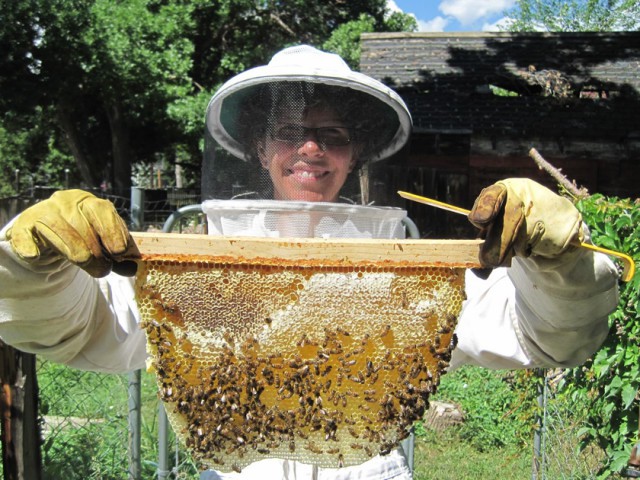
THE BUZZ ON BEEKEEPING
You can do more than just thank the bees for that apple. Apples require the cross pollination provided by bees to yield producing seeds. If more people put beekeeping practices, obtained from classes like ones provided by Growing Gardens, to good use, they could help prevent bee populations from diminishing to the point where crops reliant on this pollinator no longer make it to the kitchen table.
Growing Gardens, a Boulder-based nonprofit organization whose mission is to enrich the lives of those in the community through sustainable urban agriculture, is offering its beekeeping class series from March to October for the seventh year in a row. The classes are meant for both beginners and current bee-keeping enthusiasts, and provide hands-on experience that teaches participants organic honeybee colony care, honey harvesting and wax processing.
Researchers estimate that nearly one-third of all honeybee colonies have vanished due to Colony Collapse Disorder, according to the National Resource Defense Council. Honeybees affected by the disorder get disoriented, don’t return to the colony and eventually die. Researchers have blamed pesticides and global warming for the disorder, but are still uncertain of the true cause.
“Our agricultural practices, and even some of our bee practices, of adding chemicals to hives to treat for pests and diseases are causing the collapse of bees,” says Tracy Bellehumeur, instructor for Growing Gardens’ beekeeping program. “In the end, I believe our bees’ ability to cope with pests and disease will come from their own evolution, and that the more backyard beekeepers we have that use natural methods, the more able the bees will be able to adapt.”
PALM OIL MILL WASTE CREATES HARMFUL GREENHOUSE GAS THAT MAY BE USED AS FUEL
The high demand of palm oil has caused a rapid growth of palm oil mills in developing nations of the tropics, like Malaysia and Indonesia. A new study has determined that deforestation is not the only environmental impact created by this rapid growth. The escape of climate-affecting methane gas from palm oil processing waste is a substantial contributor as well.
Forty percent of the greenhouse gas emissions created by the development and operation of these mills comes from the methane gas that seeps out of the waste lagoons created by the palm oil mills, according to Philip Taylor, a postdoctoral researcher at the University of Colorado Boulder’s Institute of Arctic and Alpine Research and one of the authors of the study.
The study, published Feb. 26 in the journal Nature Change Climate, indicated that mitigating the methane gas impact by converting it into a reusable fuel would assist palm oil mills in becoming more sustainable. According to the study, “Palm Oil Wastewater Methane Emissions and Bioenergy Potential,” the amount of methane gas produced, but uncollected, from the palm oil waste last year could have provided Malaysia with a quarter of its energy needs. But only 5 percent of the mills globally are using the methane waste as a renewable energy.
“There has been a lot of research on single locations, the methane emissions at a single palm oil mill, but it’s never been put into a global scale,” Taylor says. “The study shows how it’s a major source of methane that’s really not being fully appreciated.”
There are currently no stiff regulations or financial incentives to catalyze the rapid capture of the methane gas, according to Taylor.
He says he hopes that attention to the study and pressure from organizations like Roundtable for Sustainable Palm Oil will help facilitate a change in these mills that will create a sustainable industry that causes less climate damage and creates more social and economic benefits.














